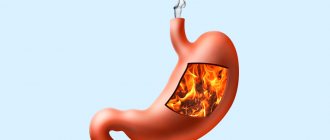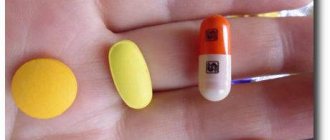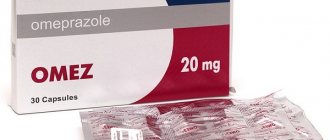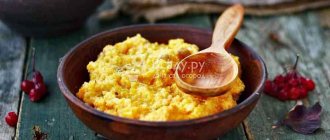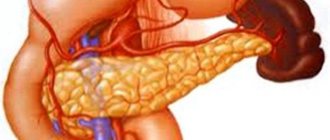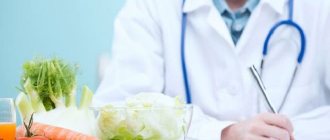Helicobacter pylori is a bacterium that lives in the stomach. It gets there through dirty food or unwashed hands.
It’s scary to imagine that almost 2/3 of the world’s population is infected with the bacterium. What’s even worse is that Helicobacter provokes the development of stomach ulcers and cancer.
An effective method of treatment that doctors talk about is antibiotics. However, they are prescribed only after testing and at a certain “concentration” of bacteria in the stomach.
If tests show you have Helicobacter in low concentrations, change your diet. Add foods that kill bacteria to it and protect your body from deadly diseases.
For those who have been prescribed antibiotics, the listed products will help in the fight against harmful bacteria.
Oranges
Add tangerines, lemons, kiwis and grapefruits to the oranges. All citrus fruits are rich in vitamin C. Studies have shown that people whose diet included foods with ascorbic acid were less susceptible to infection with the bacterium. This is easy to explain - vitamin C is contained in the stomach mucus, which destroys the organ from inflammation and prevents Helicobacter from provoking the development of ulcers and cancer.6
What not to eat if you have Helicobacter pylori
The patient should always have a list of what not to eat if helicobacter pylori is present. This will allow you not to break the prohibitions and not harm your own health.
So, the menu should not contain the following products:
- Any fatty food is prohibited.
It is difficult for the body to digest, takes a long time and is poorly digested, and puts a strain on a sore stomach. The body spends a large amount of acids and enzymes on the decomposition of fatty foods. When there are pathological changes in the stomach caused by Helicobacter pylori, it will not be easy for him to cope with fatty foods. Patients may notice that after consuming such products they develop dyspeptic disorders.
- Mushrooms.
They are heavy foods that are difficult to digest. In this regard, mushrooms can be compared to fried fatty meat. Moreover, the method of processing mushrooms does not affect the quality of their digestion. Therefore, they should be abandoned during treatment.
- Preserved products.
It will be necessary to remove all canned food, pickles, and marinades from the menu. These products contain acetic acid, which irritates the stomach. Moreover, the ban is imposed not only on factory-made canned food, but also on home-made products. You should not eat dishes containing large amounts of herbs and spices.
- Products that have undergone a smoking process.
Smoked meats that are infected with Helicobacter pylori should be completely abandoned. All such products contain a lot of fat, harmful seasonings and chemical components. You should even refrain from eating sausage during the treatment period.
- Sour apples and fruits are contraindicated for consumption.
, since they will irritate the stomach, weakened by the action of Helicobacter pylori.
- Alcohol.
If alcohol is not recommended to be consumed even by healthy people, then it is strictly contraindicated for patients with pathologies of the digestive system.
Liquorice root
It helps not only cure cough, but also fight harmful bacteria. The product prevents Helicobacter from attaching to the walls of the stomach.
Licorice root syrup can be purchased at any pharmacy and taken for preventive purposes.10
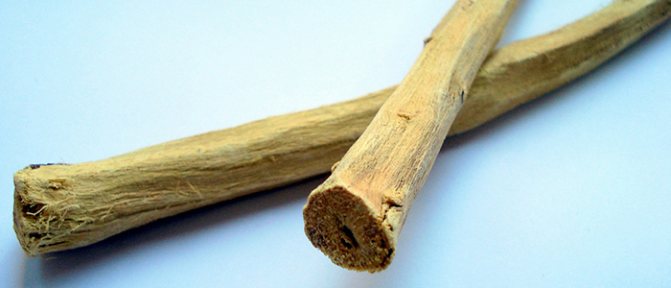
The listed products will help both treat and prevent Helicobacter pylori. Do not replace them with medications prescribed by your doctor. Use everything together to quickly get rid of harmful bacteria.
There is a list of foods that increase the concentration of Helicobacter pylori in the body. Try to exclude them from your diet.
What can you eat if you have Helicobacter pylori?
The patient should be informed by the doctor about what can be eaten with Helicobacter pylori. Moreover, a person himself will notice that when he eats something “forbidden”, he experiences discomfort in the abdomen, pain, heartburn, nausea and even vomiting may appear. To avoid progression of the disease, food for Helicobacter pylori must be properly selected.
The list of what you can eat if you have Helicobacter pylori includes the following foods and dishes:
- Dairy
, which have a low fat content. You can eat yogurt, cottage cheese, milk, fermented baked milk, kefir, and yogurt. You need to limit hard cheeses on the menu, as they always have a high percentage of fat content.
- Soups and cereals.
If the products were ground during cooking or are present on the table in liquid form, then the stomach and intestines will cope with their processing faster. Moreover, porridge envelops the walls of the stomach, reducing the intensity of painful sensations. It is necessary to ensure that soups and broths are not too rich and fatty. Porridge also needs to be thoroughly boiled.
- Kissels and compotes.
It is necessary to drink these drinks, but they should be prepared using fresh berries or fruits. You cannot purchase or prepare powdered jelly that contains dyes and flavors, as well as other chemical components. This is harmful to the stomach, which is affected by pathogenic flora. Homemade jelly and compotes, on the contrary, have a positive effect on its condition and also saturate the body with vitamins.
- Foods that have been steamed.
If you steam foods, they will contain a minimum amount of fat and a maximum amount of vitamins. Steamed dishes do not irritate an inflamed stomach, so you can eat them every day. In addition, a person will not suffer from radical changes in the menu. If he likes fried cutlets, then they can be replaced with steamed meatballs. The taste of the fish does not suffer if you avoid frying it in a large amount of oil and treat it with steam.
- Eggs.
A chicken egg is a source of vitamins, minerals and amino acids. This is an incredibly valuable product that should not be forgotten. However, frying eggs with Helicobacter pylori is not recommended. They can only be boiled. You should not drink raw eggs, especially when you are not sure of the quality of the product.
- Dried bread.
Baking and confectionery products are contraindicated for Helicobacter pylori. However, giving up bread can sometimes be very difficult. During treatment, you can eat dried bread. Rusks can be consumed as an independent dish or together with other products. It's good to eat crackers with tea. Preference should be given to white bread, since black bread is made from wholemeal flour. A sick stomach can react negatively to such food. In turn, crackers made from wheat flour will not cause irritation.
- Water
, which does not contain gases. You should refrain from drinking sweet soda while dieting. Such drinks can harm even a healthy stomach. People with pathologies of the gastrointestinal tract should avoid using them altogether. It is recommended to drink at least 1.5 liters of clean water per day. You can also drink fruit and vegetable juices, but not from the store, but prepared at home.
If there are any doubts about what you can and cannot eat with Helicobacter pylori, then you need to consult a specialist about this.
Table - what you can and cannot eat on a diet

Diet for Helicobacter pylori: what you can and cannot eat (table):
| Products and dishes | Allowed (can be eaten) | Prohibited (not allowed) |
| Bakery products | Wheat bread made from grade I and II flour, daily or dried, crackers, unsweetened and unsalted biscuits | Black rye bread, fresh bread, baked goods and pastries |
| Eggs | Chicken and quail eggs, but no more than 2 pcs. per day in the form of omelettes or soft-boiled | Goose and duck eggs |
| Soups | Soups with water and weak vegetable broth, pureed milk and slimy soups | Meat, fish and mushroom broth and dishes prepared on their basis |
| Meat | Lean dietary meat, preferably boiled rabbit, turkey fillet, young veal, skinless chicken | Fatty meats, animal fat, lard, sausages, semi-finished products, canned food, salted, smoked and dried meat |
| Dairy | Whole milk, kefir, curdled milk, bio-yogurt, fermented baked milk, low-fat cottage cheese (up to 2.5%), low-fat unsalted hard and soft cheese | Homemade cottage cheese and sour cream, cream, smoked and processed cheese, fatty varieties of hard cheese |
| Fish | Sea and river lean fish, seafood | Fatty fish, canned food, smoked meats, salted fish |
| Vegetable oils | Unrefined, cold-pressed oils rich in omega-3 acids and vitamins: sesame, flaxseed, soybean, walnut, pumpkin, grape seed, sunflower, corn; use for dressing salads and adding to prepared dishes | Refined oils, never cook food by frying in oil |
| Cereals | Brown rice, buckwheat, oats, wheat, egg, semolina | Millet, pearl barley, corn grits |
| Pasta | All types, moderate | — |
| Mushrooms | — | All types of mushrooms, including champignons and oyster mushrooms |
| Seasonings and sauces | White milk sauce on water | All types of spices and hot seasonings, tomato sauces, ketchups, mayonnaise, mustard, horseradish, vinegar |
| Beverages | Infusion of rose hips and sea buckthorn, herbal teas (chamomile, lemon balm, mint), compotes and uzvars, jelly, still mineral water, green tea, chicory root drink, berry fruit drinks | All types of alcohol, energy drinks, coffee, black tea, carbonated drinks, lemonade, cocoa |
| Vegetables | All types of fruits without peel and after cooking, except prohibited ones | Legumes, radish, white cabbage, turnip, radish, horseradish, garlic, onion, ginger |
| Fruits and berries | Sweet fruits, juices from them | Sour fruits, juices from them, as well as peaches, grapes, raisins, dates, cherries and cherries |
| Oil | Unsalted butter | Cooking fat, margarine and all products in the recipe of which they are present |
| Dessert | Mousses, jellies, puddings, marmalade, marshmallows, marshmallows, natural honey, jam, marmalade, jam, confiture | All confectionery products with butter bread, sweet biscuits, chocolates, candies |
What is the Helicobacter pylori bacterium afraid of?
We do not rule out that you may be thinking: “What a strange question?” If the bacterium Helicobacter pylori is not afraid of hydrochloric acid, then how can it be afraid?” It turns out that you can not only scare her, but also act more radically - deprive her of the right to life. However, let's understand everything in order.
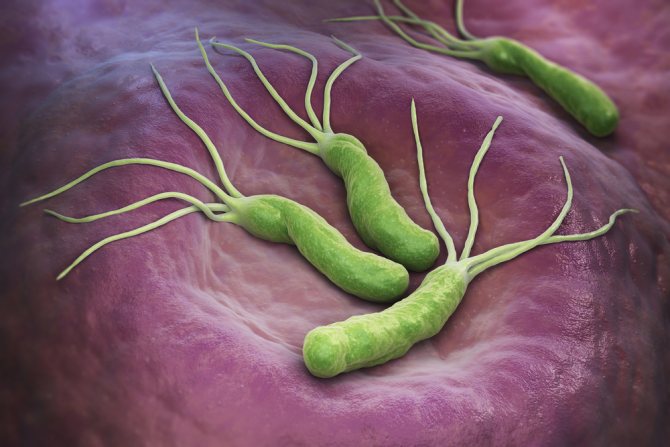
Bacteria Helicobacter pylori
What do new people and clients who come to Forever to solve problems with the gastrointestinal tract (GIT) usually complain about? That's right, for heartburn.
If everything is fine with your stomach, chest, legs, no royal treasures can add anything. Horace
A very unpleasant feeling, let us tell you. When something so burning rolls right up your throat. This is especially unpleasant at night! When you wake up in the middle of the night from this disgusting feeling. It seems from your sleep that you are about to choke in this abomination! Brrrr!
At the same time, not everyone treats heartburn with full responsibility! The majority of people don't attach much importance to this. You ate or drank something wrong the day before, or overate, and so on. But in vain!
Because it would be good if we could get to the bottom of it right away. This is a fairly serious symptom of a number of diseases. The main cause of heartburn, and therefore increased levels of acid in the stomach, is the bacterium Helicobacter pylori.
A little background on the issue
Why did we pay attention to this? Because for a long time, all problems with the gastrointestinal tract were reduced to increased acidity in the stomach. Many different diets and medications have been proposed to reduce it.
Acidity decreased, but problems with the gastrointestinal tract remained. Peptic ulcer disease occurs in almost every sixth European resident over the age of 45.
Until, in 1983, a group of Australian researchers came to the conclusion that the cause was the bacterium Helicobacter pylori. Translated from Latin, this means “stomach spiral microbe.” For this discovery, the researchers became Nobel laureates.
Helicobacter bacterium: what is it and how is it dangerous for us?
This is a bacterium that lives in the stomach and feeds on its epithelium. She has adapted perfectly to living in stomach acid!
The fact is that, according to available information, up to 30% of the population is infected with Helicobacter in developed countries, and up to 90% in developing countries. How many, in your opinion, are there in Ukraine? Up to 80%! That's why we decided to give more detailed information on this topic.
The same researchers proposed a radical solution to destroy Helicobacter - antibiotics. Yes, they help. However, few people pay attention to the consequences of the use of antibiotics - dysbiosis with all the ensuing consequences.
Proper nutrition as a method of treatment
It has been established that the presence or absence of Helicobacter in the body does not depend on food, but a properly selected diet is extremely valuable. Proper nutrition will help relieve gastritis and improve your well-being. The diet is used during periods of exacerbation of gastritis. Remember, the diet plan is prescribed by the attending physician.
The diet for the treatment of Helicobacter Pylori is prescribed depending on the method and nature of the manifestation of the bacterium in the body. If a person simply has a bacteria in the body that causes gastritis, for prevention it is recommended to adhere to a proper diet and not to overeat. If bacteria cause an ulcer or gastritis, foods that increase gastric secretion are excluded from the diet. For example, you should not consume meat and fish broths.
You can get rid of stomach ulcers and gastritis by drinking milk heavily. It is recommended to drink up to five cups per day. It is useful to cook slimy milk soups with oatmeal, semolina and buckwheat. For additional intake of vitamins into the body, steamed bran is consumed. To quickly restore the gastric mucosa, you need proteins. It is recommended to eat eggs, cheese, cottage cheese and kefir. You can indulge in low-fat meat and fish cutlets. If the body does not receive enough calories, it is allowed to eat butter. If the result of treatment with diet is positive, the diet is expanded to include ham, sour cream and yogurt. As the ulcers and erosions of the stomach heal, the patient is prescribed recovery diet No. 15.
Certain general recommendations have been developed for a general therapeutic diet. It is not recommended to eat fried, smoked and fatty foods. It is better to eat fresh boiled or steamed foods. For gastritis, split meals are recommended. It is not recommended to eat white bread, chocolate and cookies. It is healthy to eat crackers, cereals, vegetable oil, lean meat and fish. Herbal stomach preparations have a good effect on the body. You will definitely need to eliminate smoking, alcohol, coffee and carbonated drinks.
Quick page navigation
Helicobacter pylori is a bacterium that causes ulcerative and inflammatory processes in the stomach and duodenum.
An insidious pathogen is capable of surviving and multiplying in the aggressive environment of the stomach, causing serious damage to the body and causing digestive problems (read more about what Helicobacter pylori is and tests for detection).
The main signs of Helicobacter pylori infection:
- pain in different areas of the epigastrium of various types (aching, paroxysmal, spasmodic, intense, periodically occurring and constant);
- belching, sour taste in the mouth after eating;
- nausea, vomiting;
- flatulence (intensive gas formation in the intestines, seething and rumbling in the stomach);
- black stool (a sign of internal bleeding);
- weakness, loss of performance, lack of appetite.
If these signs occur, you should immediately contact a gastroenterologist, who will examine the patient and prescribe the necessary laboratory tests, as well as establish an accurate diagnosis and prescribe appropriate therapy and diet.
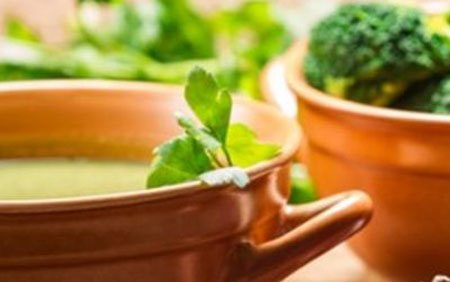
Treatment of peptic ulcers and gastritis involves complex therapy, including the use of antibacterial agents and other dosage forms, as well as the use of special gentle nutrition. It should be noted that Helicobacteriosis is treated all over the world with a complex of antibiotics, which can only be prescribed by a competent specialist.
- Without following a diet, inflammatory diseases of the gastrointestinal tract cannot be cured, so the patient’s healing depends on the strict adherence to all recommendations of the gastroenterologist and nutritionist.
Treatment table 1, 1a and 1b is recommended for patients with gastritis and peptic ulcers, and this is the basis of recovery. Depending on the stage of inflammation, the degree of development of the disease and the patient’s condition, the doctor gives clear individual nutritional recommendations.

